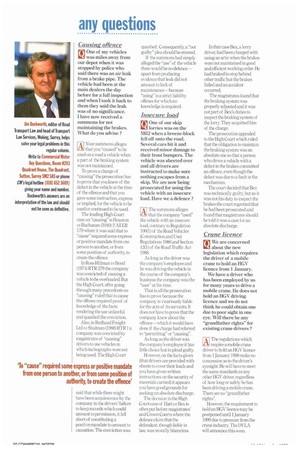any questions
Page 62

If you've noticed an error in this article please click here to report it so we can fix it.
Jim Duckworth, editor of Road Transport Law and head of Transport Law Services, Woking, Surrey, helps solve your legal problems in this regular column. Write to Commercial Motor Any Questions, Room H203 Quadrant House, The Quadrant Sutton. Surrey SM2 5AS or phone Clf's legal hotline (0181 652 3689) giving your name and number. Duckworth's answers are an interpretation of the law and should not be seen as definitive.
Causing offence
One of my vehicles was miles away from our depot when it was stopped by police who said there was an air leak from a brake pipe. The vehicle had been at the main dealers the day before for a full inspection and when! took it back to them they said the leak was of no significance. I have now received a summons for not maintaining the brakes. What do you advise ?
A Your summons alleges
that you "caused" to be used on a road a vehicle when a part of the braking system was not maintained.
To prove a charge of "causing" the prosecution has to prove that you knew of the defect in the vehicle at the time of the offence and that you gave some instruction, express or implied, for the vehicle to be used or continued to be used.
The leading High Court case on "causing" is Houston vs Buchanan (1940) 2 All ER 179 where it was said that to "cause" required some express or positive mandate from one person to another, or from some position of authority, to create the offence.
In Ross Hillman vs Bond (1974) RTR 279 the company was convicted of causing a vehicle to be overloaded. But the High Court, after going through many precedents on "causing" ruled that to cause the offence required proof of knowledge of the facts rendering the use unlawful and quashed the conviction.
Also, in Redhead Freight Ltd vs Shulman (1988) RTR 1 a company was convicted by magistrates of "causing" drivers to use vehicles in which tachographs were not being used. The High Court said that while there might have been acquiescence by the company in the drivers' failure to keep records which could amount to permission, it fell short of constituting a positive mandate to amount to causation. The conviction was quashed. Consequently, a "not guilty" plea should be entered.
If the summons had simply alleged the "use" of the vehicle there would be no defence— apart from producing evidence that leak did not amount to lack of maintenance—because "using" is a strict liability offence for which no knowledge is required.




























































































































